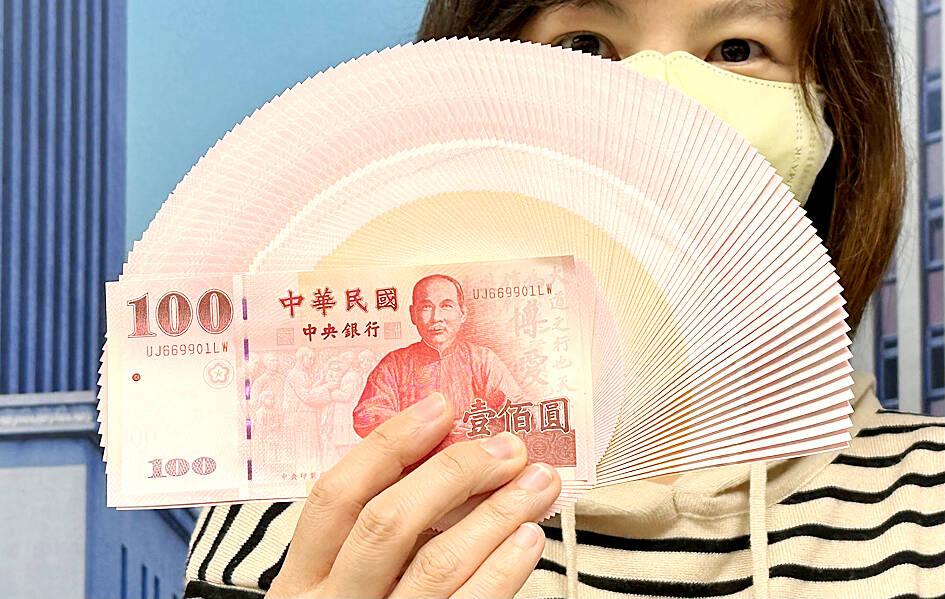The New Taiwan dollar yesterday advanced another 0.9 percent to hit a seven-month high of NT$29.7 versus the US dollar in Taipei trading, rising above the NT$30 mark for a second straight day on the back of hot money inflows, dealers said.
This week alone, the local currency picked up 2.2 percent after global capital regained interest in emerging markets, including Taiwan, on expectations that the US Federal Reserve would slow its pace of tightening, making investment in vehicles other than the greenback more attractive, dealers said.
The speculation won support from the Fed’s latest interest rate hike of 0.25 percentage points, moderating from its previous increases of 0.5 to 0.75 percentage points. Fed Chair Jerome Powell on Wednesday said that inflation is slowing and the US would avoid a recession this year.

Photo: Chen Mei-ying, Taipei Times
Global bourses welcomed the Fed’s dovish-leaning stance, with the TAIEX yesterday rallying 1.14 percent, or 175.03 points, to 15,595.16, Taiwan Stock Exchange (TWSE) data showed.
Foreign institutional investors yesterday increased holdings in local shares by a net NT$22.54 billion (US$758.9 million), after raising their stakes for the past 13 consecutive sessions, TWSE statistics showed.
If the trend continues, it would lend further strength to the local currency, dealers said.
Foreign exchange turnover yesterday amounted to US$1.66 billion at Taipei Forex Inc, the central bank said.
In other developments, the Cabinet yesterday appointed former vice premier Shen Jong-chin (沈榮津) as chairman of state-owned Taiwan Financial Holdings Co (台灣金控). Shen had also served as minister of economic affairs prior to his stint as vice premier from 2020 to last month.
Incumbent Taiwan Financial Holdings chairman Joseph Lyu (呂桔誠) is to stay on as the chairman of the group’s flagship subsidiary Bank of Taiwan (臺灣銀行).
Shen’s appointment takes effect today.

Japanese technology giant Softbank Group Corp said Tuesday it has sold its stake in Nvidia Corp, raising US$5.8 billion to pour into other investments. It also reported its profit nearly tripled in the first half of this fiscal year from a year earlier. Tokyo-based Softbank said it sold the stake in Silicon Vally-based Nvidia last month, a move that reflects its shift in focus to OpenAI, owner of the artificial intelligence (AI) chatbot ChatGPT. Softbank reported its profit in the April-to-September period soared to about 2.5 trillion yen (about US$13 billion). Its sales for the six month period rose 7.7 percent year-on-year

CRESTING WAVE: Companies are still buying in, but the shivers in the market could be the first signs that the AI wave has peaked and the collapse is upon the world Taiwan Semiconductor Manufacturing Co (TSMC, 台積電) yesterday reported a new monthly record of NT$367.47 billion (US$11.85 billion) in consolidated sales for last month thanks to global demand for artificial intelligence (AI) applications. Last month’s figure represented 16.9 percent annual growth, the slowest pace since February last year. On a monthly basis, sales rose 11 percent. Cumulative sales in the first 10 months of the year grew 33.8 percent year-on-year to NT$3.13 trillion, a record for the same period in the company’s history. However, the slowing growth in monthly sales last month highlights uncertainty over the sustainability of the AI boom even as

AI BOOST: Next year, the cloud and networking product business is expected to remain a key revenue pillar for the company, Hon Hai chairman Young Liu said Manufacturing giant Hon Hai Precision Industry Co (鴻海精密) yesterday posted its best third-quarter profit in the company’s history, backed by strong demand for artificial intelligence (AI) servers. Net profit expanded 17 percent annually to NT$57.67 billion (US$1.86 billion) from NT$44.36 billion, the company said. On a quarterly basis, net profit soared 30 percent from NT$44.36 billion, it said. Hon Hai, which is Apple Inc’s primary iPhone assembler and makes servers powered by Nvidia Corp’s AI accelerators, said earnings per share expanded to NT$4.15 from NT$3.55 a year earlier and NT$3.19 in the second quarter. Gross margin improved to 6.35 percent,

FAULTs BELOW: Asia is particularly susceptible to anything unfortunate happening to the AI industry, with tech companies hugely responsible for its market strength The sudden slump in Asia’s technology shares last week has jolted investors, serving as a stark reminder that the world-beating rally in artificial intelligence (AI) and semiconductor stocks might be nearing a short-term crest. The region’s sharpest decline since April — triggered by a tech-led sell-off on Wall Street — has refocused attention on cracks beneath the surface: the rally’s narrow breadth, heavy reliance on retail traders, and growing uncertainty around the timing of US Federal Reserve interest-rate cuts. Last week’s “sell-off is a reminder that Asia’s market structure is just more vulnerable,” Saxo Markets chief investment strategist Charu Chanana said in